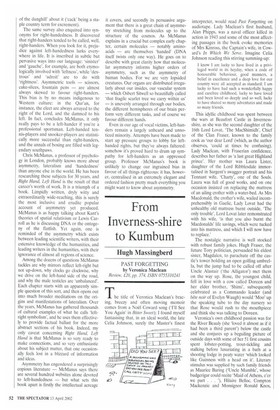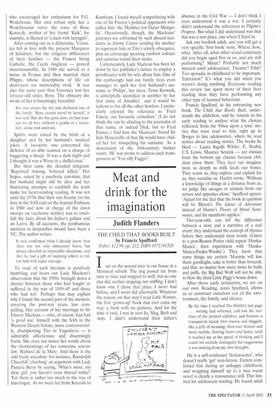From Inverness-shire to Kumbum
Hugh Ma ssingberd
PAST FORGETTING by Veronica Maclean Review, £20, pp. 374, ISBN 0755310241 The title of Veronica Maclean's bracing, breezy and often moving memoir comes from a Noel Coward song (I'll See You Again' in Bitter Sweet); I found myself fantasising that, in an ideal world, the late Celia Johnson, surely the Master's finest interpreter, would read Past Forgetting on audiotape. Lady Maclean's first husband, Alan Phipps, was a naval officer killed in action in 1943 and some of the most affecting passages in the book evoke memories of Mrs Kinross, the Captain's wife, in Coward's In Which We Serve. Imagine Celia Johnson reading this stirring summing-up:
I know I am lucky to have lived in a privileged world in its heyday, when a code of honourable behaviour, good manners, a belief in excellence and a deep love for our country were all accepted as standard: I am lucky to have had such a wonderfully happy and carefree childhood, lucky to have loved and been loved so deeply and so well, lucky to have shared so many adventures and made so many friends.
This idyllic childhood was spent between the wars at Beaufort Castle in Invernessshire, as she was the second daughter of the 16th Lord Lovat, 'The MacShimidh', Chief of the Clan Fraser, known to the family cook as 'our dear Lord' (which, as the author observes, 'could at times be confusing). Lady Maclean, with Fraserian confidence, describes her father as 'a last great Highland prince'. Her mother was Laura Lister, daughter of the Lord Ribblesdale immortalised in Sargent's swagger portrait and his Tennant wife, `Charty', one of the Souls. Laura was full of good works, and on one occasion insisted on replacing the mattress of an ailing crofter with a water-bed. As Mrs Macdonald, the crofter's wife, wailed incomprehensibly in Gaelic, Lady Lovat had the unhealthy old mattress burnt outside. 'The only trouble', Lord Lovat later remonstrated with his wife, 'is that you also burnt the Macdonalds' life savings, which were tucked into his mattress, and which I will now have to replace.'
The nostalgic narrative is well stocked with robust family jokes. Hugh Fraser, the future Tory politician, persuaded his eldest sister, Magdalen, to parachute off the castle's tower holding an open golfing umbrella, but the jump had to be called off after Uncle Alastair ('the Alligator') met them on the way up. Rose, the youngest child, fell in love with a cow called Doreen and her elder brother, 'Shinn', subsequently celebrated as a Commando leader (and bete noir of Evelyn Waugh) would 'Moo' up the speaking tube to the day nursery so that Rose would rush to the mouthpiece and think she was talking to Doreen.
Veronica's own childhood passion was for the River Beauly (she 'loved it almost as if it had been a third parent') below the castle and she conjures up a beguiling picture of outside days with some of her 51 first cousins spent lobster-potting, trout-tickling and stalking before luxuriating in a bath at a shooting lodge in peaty water 'which looked like Guinness with a head on it'. Literary stimulus was supplied by such family friends as Maurice Baring (`Uncle Mumble', whose budgerigar could recite 'Maid of Athens, e'er we part . . . '), Hilaire Belloc, Compton Mackenzie and Monsignor Ronald Knox, who encouraged her enthusiasm for P.G. Wodehouse. Her own robust style has a Wodehousian verve: the voice of Rose Kennedy, mother of her friend `Kick', for example, is likened to 'a duck with laryngitis'.
After coming out as a debutante, Veronica fell in love with the present Marquess of Salisbury, but the religious differences of their families — the Frasers being Catholic, the Cecils Anglican — proved insurmountable. In 1940 she served as a nurse in France and then married Alan Phipps, whose descriptions of life on destroyers are memorably vivid. It was also the same year that Veronica lost her 14-year-old sister, Rose. The obituary she wrote of her is hauntingly beautiful: She was always the shy and sheltered one of the family, 'Rose cannot travel by herself,' it was said. But she has gone now, on that journey we all fear, without a qualm or a hesitation, alone and unafraid.
Spirits were raised by the birth of a daughter and by her husband's nautical jokes. A favourite one concerned the defence of an able seaman on a charge of buggering a sheep: 'It was a dark night and I thought it was a Wren in a duffel-coat.'
But then came the dreaded telegram. `Reported missing, believed killed.' Her hopes, raised by a psychotic con-man, that her husband might still be alive and her frustrating attempts to establish the truth make for heart-rending reading. It was not until the 1970s that their son Jeremy (to the fore in the SAS raid on the Iranian Embassy in 1980 and now in charge of the dawn swoops on racehorse stables) was to establish the facts about his father's gallant end on Leros. By all accounts, the posthumous mention in despatches should have been a VC. The author writes:
It only confirmed what I already knew: that Alan was not only immensely brave, but always cheerful in impossible situations, and that he had a gift of inspiring others to follow him with equal courage.
To read of such heroism is positively humbling and bears out Lady Macleart's observation that the 1950s `brought down a shutter between those who had fought or suffered in the war of 1939-45 and those who had not'. Perhaps that may explain why I found the second part of the memoir, covering the post-war years, less compelling. Her account of her marriage to Sir Fitzroy Maclean — who, of course, had had 'a good war' himself with the SAS in the Western Desert before, more controversially, championing Tito in Yugoslavia — is admirably affectionate and disarmingly frank. She does not mince her words about the shortcomings of her sometime son-inlaw, Richard de la Mare. And there is the odd fruity anecdote: for instance, Randolph Churchill 'clinching' an argument with Lady Pamela Berry by saying, 'What's more, my dear girl, you haven't even shaved today!' Yet there is rather too much in the way of travelogue. As we were led from Korcula to
Kumbum. I found myself sympathising with one of Sir Fitzroy's political opponents who called him 'the Member for Outer Mongolia'. Occasionally, though, the Macleans' journeys are enlivened by such absurd incidents as Jimmy Carter sending his mother to represent him at Tito's stately obsequies, plus an entourage sporting rainbow colours and cameras round their necks.
Unfortunately Lady Maclean has been let down by her publisher's failure to employ a proofreader with his wits about him. One of the confusingly laid out family trees even manages to spell her first husband's surname as 'Philips', her niece, Tessa Keswick, is unhelpfully identified in another by her first name of Annabel; and it would be tedious to list all the other howlers. I particularly enjoyed the reference to 'Fred Emery, our favourite comedian.' (I do not think she can be alluding to the journalist of that name, or indeed Dick, but to Fred Emney.) And how the Macieans' friend Sir fain Moncreiffe of that Ilk would have chided her for misspelling his surname. As a descendant of the 16th-century banker count, 'Ilk' was prone to address such transgressors as 'You silly Fugger'.



















































































 Previous page
Previous page